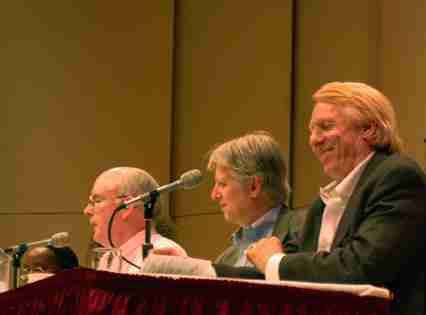Some of the country’s leading supporters of social activism met on Loyola’s campus to discuss the past, present and future of New Orleans’ ‘working poor’ communities as part of the “After the Storm” panel series.
The panel, “The Working Poor of New Orleans,” was held in Roussel Hall last Thursday. Panelists talked about racial and economic segregation, education and low-income housing in New Orleans.
“Over 68,000 residents participated in federal aid in 2004. Most of them were the working poor, majority African American, holding jobs in hospitality and retail,” said Alan Berube of the Brooking Institute.
“What is the working poor?” asked William Quigley, director of Loyola’s Gillis Long Poverty Law Center.
“It is anyone who needs someone else’s help. Most of New Orleans was poor before Katrina,” he said.
“Over 25 percent of the city doesn’t have access to a car,” he added. “That’s not a green choice, not an anti-oil decision. It’s because they can’t afford one.”
Wade Rathke, founder of ACORN, the nation’s largest community organization of low- and moderate-income families, added that the bulk of that revenue was not coming through the French Quarter but through the many conventions held in New Orleans.
“What keeps people attached to poverty? The public schools,” said Jarvis DeBerry, Times-Picayune columnist.
Rathke added that many who graduate from universities in New Orleans leave the city because there aren’t enough jobs in their fields of study. The jobs that are available in the city – hotels, restaurants and retail – drive the educational system, according to Rathke.
In post-Katrina New Orleans, the conditions have only worsened.
Mary Patillo, professor of sociology at Northwestern University, claims that no two people living together, working minimum wage jobs, can afford an apartment in the city.
Aside from a lack of well-paying jobs, the residents must now compete for any kind of work.
“Jobs are going to out-of-towners, white guys and Latinos,” Quigley said.
But the housing shortage struck the loudest chord with the panel.
“I am angered at the extent of the housing shortage. [Politicians] have been spineless and despicable,” DeBerry said.
“I hope they are voted out,” he added, as the audience cheered. “Too many politicians have done the wrong thing.”
“Some units of public housing are not open to residents. There’s no cooperation,” Parham said. “There are levels of competition between branches, turf wars.”
Rathke added that the government has abandoned its housing programs and that will make rebuilding in New Orleans almost impossible.
“There is no way to build the city of the future if there is no accountability,” he said.
“Poverty affects us all. It undermines the values we say we believe.”
Mark Robert Rank, professor of social welfare at Washington University, was also a panelist.
Lydia Voigt, the Reverend Joseph H. Fichter Distinguished Professor of Sociology, moderated the discussion.
Michelle Lopez can be reached at [email protected].







